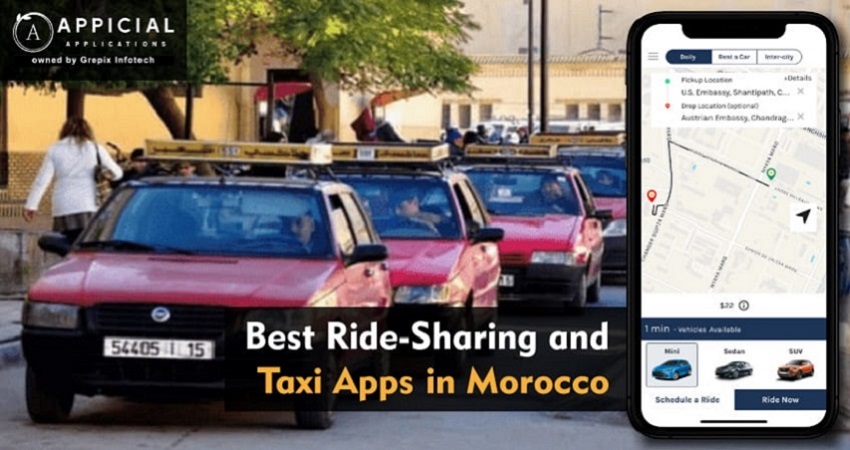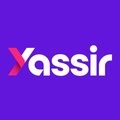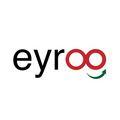
Best Ride-Sharing and Taxi Apps in Morocco: The Definitive Guide
What if we told you that Morocco’s ride-hailing market is growing faster than ever, powered by millions of smartphone users and a booming digital economy?
What if the simple act of tapping a button on your phone could reshape traffic, reduce pollution, and create thousands of jobs?
And most importantly…
Are ride-sharing apps becoming Morocco’s most essential urban utility?
Welcome to Morocco’s Digital Mobility Revolution
Over the past few years, cities like Casablanca, Marrakech, Rabat, and Tangier have evolved into vibrant tech hubs. With smartphone penetration crossing 75%, and urbanization growing at more than 2% annually, Morocco is embracing ride-hailing platforms at record speed. Today, urban residents no longer wait on sidewalks waving at taxis; they book safe, fast, affordable rides with a single tap, anytime, anywhere.
The shift is so massive that Morocco is now recognized as one of North Africa’s fastest-growing ride-sharing markets, driven by a young, tech-savvy population (nearly 40% of Moroccans are under 30) and a government pushing aggressively toward Smart City goals.
From reducing Comissions and traffic congestion to creating thousands of driver-partner opportunities, ride-sharing apps are doing more than offering transport—they are reshaping daily life.
So let’s dive into:
- The rise of Morocco’s digital mobility
- The top ride-hailing apps dominating the market (Careem, Heetch, Yassir, Roby & more)
- Why taxi apps matter now more than ever
- What’s next for Morocco’s booming mobility sector
- And importantly… how companies like Appicial Applications are powering the entire revolution.
In the past decade, Morocco has emerged as a leader in North Africa’s ride-sharing revolution, driven by rising smartphone use, urbanization, and digital innovation. Cities like Casablanca and Marrakech have embraced this shift, transforming from traditional taxi services to tech-powered platforms such as Careem, Heetch, Yassir, and Roby. These apps offer real-time tracking, cashless payments, and improved safety, making urban transport more efficient and accessible. At the forefront of this transformation is Appicial Applications, a premier taxi app development company empowering businesses with scalable, user-friendly mobility solutions. Through innovative features like GPS tracking and multilingual support, Appicial has helped shape the modern Moroccan transportation ecosystem. Their deep market expertise and customizable platforms make them a trusted partner for anyone entering the ride-sharing industry. As Morocco advances toward a smarter, digital future, Appicial continues to lead the way, building the tools that drive seamless mobility and enhance everyday urban experiences.
Why Ride-Sharing Matters in Morocco Today?
In Morocco, where bustling city streets often mean bumper-to-bumper traffic and inconsistent public transportation, the ride-sharing app has emerged as more than just a tech trend — it’s a lifesaver for daily commuters. With growing urban sprawl and a rising demand for flexible transport options, ride-sharing has transformed from a convenience into a critical pillar of modern urban mobility.
This shift marks a major milestone in the evolution of the Morocco ride-hailing market. What was once dominated by traditional taxis is now shared with agile, app-based platforms that offer real-time vehicle tracking, fair pricing, digital payments, and a safer experience for both riders and drivers.
Today, the ride sharing taxi app in Morocco is not just about getting from point A to point B. It’s about giving people access to reliable transport, reducing traffic congestion, and creating new economic opportunities — all while contributing to a smarter, greener Morocco.
Key Drivers of Growth in the Morocco Ride-Hailing Market:
Smartphone Penetration
Nearly 75% of Moroccans now own smartphones, making mobile-based solutions like ride hailing taxi apps accessible to a large portion of the population. This digital foundation has paved the way for widespread adoption of transportation apps that offer fast, efficient booking options.
Rapid Urbanization
Morocco's major cities Casablanca, Rabat, Marrakech, and Tangier are expanding rapidly. As more people move into urban centers, the need for scalable and smart mobility solutions grows. Ride-sharing apps are filling the gaps where traditional infrastructure falls short.
Tech-Savvy Youth
A huge percentage of Morocco’s population is under 30, and this tech-native generation is enthusiastically embracing digital platforms. For them, using a ride-sharing taxi app in Morocco is second nature—it’s fast, affordable, and fits perfectly into their mobile-first lifestyle.
Government Support and Smart City Goals
Morocco’s government is actively supporting digital transformation through Smart City programs and urban innovation projects. These initiatives align closely with the goals of ride-sharing apps: reducing carbon emissions, optimizing urban mobility, and increasing digital inclusion. With infrastructure investments and regulatory evolution, the government is helping solidify the ride hailing taxi app ecosystem as part of Morocco’s transport future.
Importance of taxi apps in Morocco's urban mobility
Taxi apps have revolutionized urban mobility in Morocco by providing a modern solution to traditional transportation challenges. These digital platforms have significantly enhanced the convenience, efficiency, and safety of getting around in busy cities. For users, the ability to book rides with just a few taps on their smartphones eliminates the uncertainty and time spent waiting for traditional taxis. The apps offer real-time tracking of vehicles, transparent pricing, and electronic payment options, making the process seamless and cashless.
For drivers, these apps have opened up new avenues for income, offering a flexible work schedule and access to a broader customer base. Moreover, the increased safety features, such as ride tracking and user reviews, have fostered a more trustworthy environment for both passengers and drivers. Overall, taxi apps have become an integral part of Morocco's urban mobility landscape, improving the accessibility of transport options and contributing to the modernization of the country's transport infrastructure.
The Evolution of Taxi Services in Morocco / Marokko
Taxi apps have become a transformative force in Morocco’s urban mobility ecosystem, reshaping how millions of people move through cities like Casablanca, Rabat, Marrakech, Tangier, and beyond. What was once a transportation system heavily dependent on traditional taxis, often unpredictable in availability, pricing, and service quality has now evolved into a smart, app-driven model built on convenience, transparency, and safety.
For passengers, the impact is immediate and tangible. With a smartphone in hand, users can now book a ride within seconds, eliminating the long waits, negotiation hassles, and uncertainty traditionally associated with street taxis. Features such as real-time GPS tracking, upfront pricing, digital receipts, and cashless payments have elevated the daily commuting experience into something smoother, faster, and far more reliable. Whether it’s navigating the narrow alleys of Marrakech or getting across Casablanca during peak hours, taxi apps provide a level of predictability that was previously hard to find.
Beyond convenience, these platforms greatly enhance safety and trust, two major concerns in urban transport. In-app driver profiles, vehicle details, live tracking, SOS buttons, and post-ride ratings contribute to a more transparent and secure experience. Riders feel more in control of their journey, knowing each ride is monitored and documented.
Top Ride-Sharing Taxi Apps in Morocco / Marokko
Several top taxi apps have gained popularity in Morocco, enhancing urban mobility and offering convenient alternatives to traditional taxi services. These apps have been instrumental in modernizing the transportation landscape in the country, providing easy booking services, transparent pricing, and improved safety features. Here are some of the leading taxi apps in Morocco:

1. Careem
Careem, a ride-hailing service that has become synonymous with urban mobility in the Middle East and North Africa, has significantly impacted Morocco's transportation landscape. As part of the global Uber family since its acquisition, Careem offers a seamless, reliable, and convenient transportation solution across several Moroccan cities. The app stands out for its user-friendly interface, allowing users to book rides easily, track their journey in real-time, and enjoy the comfort of cashless transactions.
Careem's service in Morocco includes a range of vehicle options to cater to different needs and budgets, ensuring accessibility and convenience for a broad user base. Beyond just ride-hailing, Careem has endeavored to integrate into the local community by offering additional services such as food delivery, further solidifying its presence in the daily lives of Moroccans. Its commitment to safety, customer service, and innovation has made Careem a preferred choice for urban mobility in Morocco, transforming how residents and visitors navigate the cities.

2. Heetch
Heetch has carved out a significant niche within Morocco's ride-hailing market, distinguishing itself through its unique approach to mobility and social interaction. Originating in France, Heetch made its way into the Moroccan market with a focus on providing a friendly, affordable, and reliable taxi service, particularly catering to the younger demographic and those looking for a more casual, less formal ride-sharing experience. Heetch's entry into Morocco was marked by its emphasis on creating a social connection between drivers and passengers, promoting a more relaxed and congenial atmosphere during rides.
If you want to app like Speed taxi for you traditional business Speed Taxi Clone
The platform prides itself on being accessible and easy to use, appealing to both drivers and passengers who value simplicity and efficiency in their transportation options. For drivers, Heetch presents an attractive opportunity with lower commission rates compared to competitors, directly benefiting their earnings and incentivizing high-quality service. For passengers, the app offers competitive pricing, making it a favored choice for daily commutes, night-time rides, or simply getting around the city affordably.

3. Yassir
Yassir, an innovative ride-hailing platform originating from Algeria, has expanded its footprint to include Morocco, offering a comprehensive suite of services that extend beyond simple ride-hailing to encompass food delivery, parcel shipping, and more. This expansion reflects Yassir's ambition to provide a holistic ecosystem of services tailored to the needs of its users in North Africa. In Morocco, Yassir has been well-received for its user-friendly app, competitive pricing, and the convenience of having multiple services under one digital roof, catering to the growing demand for integrated mobile solutions.
Yassir differentiates itself with a strong emphasis on local adaptation and technological innovation, aiming to offer services that are not just about mobility but also about enhancing the daily lives of its customers. The platform's commitment to reliability, safety, and customer satisfaction has helped it gain traction among a wide user base, looking for efficient and versatile solutions to urban challenges. For drivers, Yassir offers a flexible and lucrative opportunity to earn income, supported by a company that values their contribution and seeks to foster a positive and supportive community.

4. Uber
Uber's entry into Morocco marked a significant shift in the country's urban transportation landscape, bringing with it the global standards of convenience, safety, and technological innovation associated with the brand. Uber introduced a modern ride-hailing service to Moroccan cities, offering a reliable and efficient alternative to traditional taxi services. The app's user-friendly interface allows customers to book rides with ease, track their driver's arrival in real-time, and enjoy the comfort of cashless payments, all features that significantly enhance the user experience.
Also Read: Exploring the Best Taxi Apps in Albania
Despite its global reputation and widespread popularity, Uber's journey in Morocco has faced challenges, including regulatory hurdles and pushback from traditional taxi services. These challenges have led to adjustments in its operations and offerings in the country. However, Uber's commitment to providing a high-quality service has not waned. The company continues to engage with local authorities and stakeholders to navigate the regulatory landscape and find a sustainable path forward.

5. Roby
Roby's journey began as a response to the growing need for a more efficient and user-friendly taxi service in Morocco. Launched to modernize the traditional taxi industry, Roby quickly set itself apart with its innovative approach to urban mobility. By leveraging cutting-edge technology, Roby aimed to streamline the process of hailing a taxi, making it as simple as a few taps on a smartphone. The development of Roby was marked by meticulous research and a deep understanding of the local market needs, leading to a platform that not only addressed the pain points of riders but also provided a sustainable model for drivers.

6. Eyroo
Eyroo introduces a unique model in Morocco's taxi industry, seamlessly blending traditional taxi services with modern technology. By bridging the gap between the familiar reliability of traditional taxis and the efficiency of digital platforms, Eyroo offers a versatile solution that caters to a wide array of needs and preferences. This innovative approach not only ensures convenience and accessibility for passengers but also provides opportunities for traditional taxi drivers to thrive in an increasingly digital landscape. Eyroo's commitment to harmonizing tradition with innovation makes it a standout choice in Morocco's evolving transportation sector.
Why the Ride-Sharing Boom Will Continue?
Smart City Initiatives Are Ramping Up
Morocco’s government is investing heavily in Smart City infrastructure, especially in tech-forward hubs like Casablanca and Rabat. These initiatives aim to improve traffic flow, reduce emissions, and create a seamless urban living experience. Ride hailing taxi apps will play a key role in achieving these goals, acting as connectors between commuters and cleaner, more efficient mobility solutions.
5G and Enhanced Infrastructure
With the rollout of 5G networks and better mobile infrastructure, the capabilities of ride sharing taxi apps in Morocco will expand rapidly. Faster data means improved real-time tracking, instant ride-matching, and more responsive user experiences. For both drivers and passengers, this translates to shorter wait times, accurate ETAs, and smoother rides.
Demand for Safe, Cashless, and Eco-Friendly Rides
Post-pandemic habits are sticking. Riders now expect digital payments, contactless interactions, and safety first features like in-app emergency buttons and driver ratings. Additionally, there’s a growing consciousness about climate change prompting more riders to choose ride-sharing apps over private cars or polluting options.
Traditional Taxi Services Are Going Digital
As competition heats up, many traditional taxi services are embracing technology. With white-label solutions like those offered by Appicial Applications, legacy taxi fleets are now transforming into fully digital, on-demand services. This blurs the lines between old and new, making the ride hailing taxi app model more inclusive and accessible.
Upcoming Trends to Watch in the Morocco Ride-Hailing Market
Innovation is just getting started. As the market matures, here are key trends that will define the next chapter of ride-sharing in Morocco:
- Electric and Hybrid Vehicles in App Fleets As sustainability becomes a priority, expect to see more eco-friendly fleets integrated into platforms like Careem and Yassir. EV and hybrid cars reduce emissions and operating costs, aligning with both user preferences and national climate goals.
- AI-Powered Route Optimization Artificial Intelligence will power smarter ride dispatching, fuel-efficient routes, and real-time traffic management. This means faster pickups, shorter trip durations, and lower fuel consumption — all within the app interface.
- Deeper Integration with Public Transport Expect tighter coordination between ride-sharing apps and public transit systems. Future apps may allow users to book a complete journey from a ride-sharing pickup to a tram or train transfer all in one app. This level of interconnectivity supports multi-modal urban mobility, essential for growing cities.
- Super Apps & Expanded Ecosystems Leading platforms are evolving into super apps, offering not just rides but also food delivery, e-commerce integration, and digital wallets. In Morocco, apps like Yassir are already heading in this direction, becoming digital lifelines for daily needs.
Conclusion
The future of the ride sharing taxi app in Morocco is bright. As urbanization accelerates and consumer expectations evolve, digital mobility solutions will remain at the center of Morocco’s smart growth strategy.
Startups and tech companies especially those offering ride-sharing app development like Appicial Applications are enabling this transformation by building flexible, scalable platforms tailored to Moroccan needs. With every ride booked, Morocco moves closer to a cleaner, safer, and smarter transport future.
Whether you're a rider seeking convenience, a driver looking for new income streams, or an entrepreneur exploring the Morocco ride-hailing market, now is the time to get on board. The road ahead is digital and it’s wide open.
At the heart of this transformation lies the technological backbone built by visionaries in the app development space. Appicial Applications, a leading taxi app development company, stands out as a critical enabler of this shift. By empowering startups and transport providers with high-quality, scalable taxi and ride-sharing solutions, Appicial has helped pave the digital roads of Morocco’s mobility landscape. Their robust, customizable platforms support essential features such as real time GPS tracking, automated fare calculations, multi-language support, and seamless payment integration features that are now industry standards thanks to pioneers like Appicial.
Appicial's commitment to innovation, user-centric design, and performance has helped numerous businesses from local entrepreneurs to international transport ventures launch successful ride-sharing platforms tailored to Moroccan needs. The company's in-depth understanding of regional market dynamics and dedication to excellence make it the go-to partner for anyone looking to capitalize on the growing ride-sharing economy in North Africa.
Looking ahead, Appicial is set to continue shaping the future of mobility, offering powerful, tech-driven solutions that not only keep pace with Morocco’s evolving transport needs but actively lead the charge in digital urbanization. Whether you're a traditional taxi operator ready to digitize or a startup aiming to disrupt the market, Appicial Applications has the tools, expertise, and vision to make it happen.
Looking out to start your own venture like Uber? Try out our HireMe Taxi Uber Clone, the easiest way to kick-start your taxi business.





